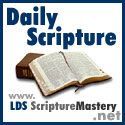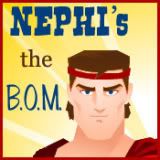When the history of this world is finally written up with an eternal perspective, many events will vie as being worthy to be included. However, because of their significance to every person who has ever lived on this earth or who will ever live on it, the events of the last week of the Savior’s life—from the Sunday morning of his triumphal entry into the city of Jerusalem to the Sunday morning of the resurrection—will undoubtedly be acclaimed as the greatest week in history. Without the events of that week, particularly those which took place in the Garden of Gethsemane and at the time of the resurrection, everything else is virtually meaningless.
Obviously an article such as this could barely list, let alone discuss, all the week’s events that are recorded in the scriptures. Thus, the article will discuss in some detail only one or two events from each day, and it will mention only briefly some of the others.
Thursday and Friday

Several significant events took place at the time of the Passover meal, which was held in the “guestchamber … a large upper room” of one of the “goodmen” in the city of Jerusalem. (See Mark 14:14–15.) Here it was revealed that Judas Iscariot should be the one who was to betray the Savior. Here the sacrament of the Lord’s Supper was instituted. Here the Savior washed the feet of the disciples and asked them to continue to perform this ordinance.
After Judas left the gathering, the Savior gave a new commandment to the remaining disciples in these words: “That ye love one another; as I have loved you, that ye also love one another.” (John 13:34.) It was also on this occasion that he counseled Peter, “… when thou art converted, strengthen thy brethren.” (Luke 22:32.)
The Savior reminded his disciples that he was soon to leave them, yet he would not leave them comfortless but would send them the “other Comforter,” the Holy Ghost. He explained that the Holy Ghost shall “bring all things to your remembrance, whatsoever I have said unto you.” (John 14: 26.)
Then the Savior uttered the superb allegory of the vine and the branches, wherein he said, “I am the true vine, and my Father is the husbandman. … I am the vine, ye are the branches: He that abideth in me, and I in him, the same bringeth forth much fruit. …” (John 15:1, 5.)
This was followed by the “high priestly” prayer of the Savior in which he said: “Father, the hour is come; glorify thy Son, that thy Son also may glorify thee:
“As thou hast given him power over all flesh, that he should give eternal life to as many as thou hast given him.
“And this is life eternal, that they might know thee the only true God, and Jesus Christ, whom thou hast sent.” (John 17:1–3.)
The Savior’s statement “the hour is come” was soon followed by his leaving the upper room and proceeding to the Mount of Olives and to the Garden of Gethsemane, where occurred one of the most important and transcendent events in the history of the world. It was here that he atoned for the original transgressions of Adam and Eve, and it was here that he took upon himself the sins of all mankind upon the condition of repentance of their sins.
The events in the Garden of Gethsemane and what happened in the next three days were so important that the Savior exclaimed, “… for this cause came I unto this hour.” (John 12:27.)
Upon leaving the Garden of Gethsemane, the Savior met Judas and “the chief priests, and captains of the temple, and the elders” who had come to take him to trial. (Luke 22:52.)
The events of the remainder of that night and the chief events of the next day (Friday) are listed by the writers of the four gospels. These events include the appearance and illegal trial before the high priest (Caiaphas) and the Sanhedrin, where he was first charged with sedition (a disturber of the peace) but was then accused of blasphemy (falsely assuming the power of God), which was the most serious charge in Jewish law.
When he was asked directly, “Tell us whether thou be the Christ, the Son of God” (Matt. 26:63), his answer was clear and definite, “I am.” (Mark 14:62.) The apostate high priest cried out, “He hath spoken blasphemy; what further need have we of witnesses? … He is guilty of death.” (Matt. 26:65–66.)
Thus one of the greatest ironies in history occurred, for Jesus, the divine Son of God, the one person who could not have been guilty of falsely assuming the power of God, was found guilty of blasphemy! Also, the only person since the fall of Adam who had power over physical death was condemned to die! However, the power to pronounce capital punishment had been taken away from the Jewish council by Roman decree; thus the leaders of the Sanhedrin had him delivered to Pilate so an official decree of death could be issued.
Daniel H. Ludlow, “The Greatest Week in History,” Ensign, Apr 1972, 34









No comments:
Post a Comment